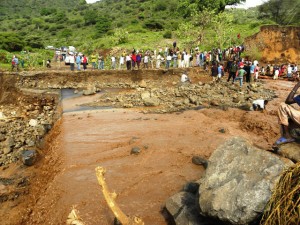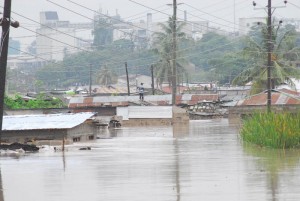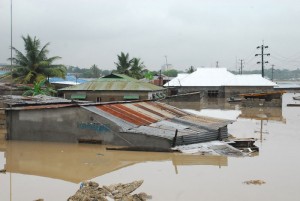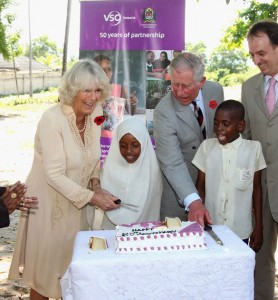Edited by John Cooper-Poole
BRIEF AUTHORITY. Charles Meek, edited by Innes Meek. Published by The Radcliffe Press. ISBN 978 1 84885 8336.
This is a memoir, published after his death with an introduction by his son, written by a man generally acknowledged by his contemporaries to have been one of the most able colonial administrators in what was then Tanganyika during the 20 years leading up to Independence. The bulk of it deals with his time as District Officer and District Commissioner in widely dispersed parts of the territory and gives a fascinating description of the work of those who spent their time far from Government Headquarters and of how many of them felt closer to “their people“ than they did to their superiors in the Secretariat in Dar es Salaam. The last chapter describes his later work in that Secretariat, where he rose to the rank of Cabinet Secretary following Independence, having been asked by the first Prime Minister, Julius K. Nyerere, to stay on in his service. That invitation was revoked by Kawawa whose first act on becoming Prime Minister was to dismiss both the Commissioner of Police and Charles Meek as a demonstration of Africanisation of the public service.
Tanganyika/Tanzania clearly won the hearts of many who ruled it while it was administered by Great Britain. This is illustrated by the fact that several felt moved to record their experience. First, there was Randal Sadleir in 1999, then Michael Longford in 2001 and now Charles Meek in 2011. All genuinely protest their love of the country and its people. There were many such. I recall my own first District Commissioner, Cecil Winnington- Ingram, whose relationship with the people of North Mara was so full of mutual admiration. Sadly, there were others of a wholly different persuasion. A District Commissioner in Bukoba could regularly be heard shouting at local people who came to his office that they were ‘Washenzi‘ (barbarians) and his South African wife inveighed against the building of schools, saying it would “give the natives ideas“ and turn them into communists.
For those who have not read the Sadleir and Longford memoirs, this book is an invaluable record of how the system of “Indirect Rule“ worked in Tanganyika Territory and of the remarkably speedy and relatively peaceful move to Independence under the fruitful relationship between Nyerere and the last Governor, Turnbull. However, it must be said that, for those who have read Sadleir and Longford, this most recent work will add little to their understanding. Longford’s 443 pages are more detailed in their descriptions of work in the Districts and Sadleir’s 328 pages are more informative than Meek’s relatively short work regarding the lead up to Independence and the twelve years that followed it. Nevertheless, it is a useful addition to the history of those times, seen from the perspective of those in charge. Perhaps one day we shall see equally interesting memoirs from those who were ruled, such as J.K.Chande’s “A Knight in Africa”, the recollections of a Tanzanian who achieved high office both before and after Independence.
Trevor Jaggar
TINGATINGA – KITSCH OR QUALITY Hanne and Tine Thorup.
Published by Thorup Art, Copenhagen, 119 pages, ISBN No. 978-87-992635- 2-3 (see also TA 97)
Tingatinga painting, introduced by the ill-fated Edward Tingatinga in 1968,
when he was 37, is traditionally carried out using bicycle enamel on Masonite board, depicting highly stylised African animals, birds, trees and other motifs, often in unnaturally brilliant colours. The almost childlike simplicity of form, the unsubtle colours and the artists’ infatuation with spots and stripes has sometimes caused the genre to be classified as “naive art”. And as the artists have always had one eye on the expatriate and tourist market, often slavishly copying popular themes and techniques and painting on boards (or in later years canvas) that can be easily transported, the rather derogatory term “airport art” has also been commonly applied.
This apparent dilemma – “Which is more naive, the paintings or the people who buy them?” seems implicit in the title of Hanne and Tine Thorup’s Tingatinga – Kitsch or Quality and in her introduction Hanne Thorup herself admits that the “Tingatinga style…seen with western eyes, sits uncomfortably between art, craft, kitsch and commodity”.
But this implies a spectrum, with kitsch and commodity at one end and art at the other, and perhaps most forms of art, if not all, have always had to fight for recognition. The works of the Impressionists, now not only accepted but widely admired, were initially regarded as “an assault on proper painting”. This is not to say that one day the best of the tingatinga painters will be hailed as once-misunderstood geniuses, but they are surely artists, not merely “mango tree fundis” armed with paintbrushes.
It is true that within fifty metres of the baobab tree (now sadly gone) where Edward Tingatinga once painted and displayed his work, you will see many “tingatinga” paintings that are not worth the board they are painted on, but if you are selective and persistent you will come across works of undeniable quality. Of those featured in the book under review Crocs in the River (Abdallah), Animal Safari and Flock of Birds (Lewis), Jungle Flowers (Mzuguno), Giraffes and Leopards and Leopards (Rubuni) and Two Leopards (Said Omary) are worthy of mention, plus the more esoteric works of Lilanga, the half-serious, half-tongue-in-cheek erotica of Mitole and the street scene Traffic Jam in Dar es Salaam (Sey).
I would have welcomed a few more paragraphs on each artist’s style as interpreted by a connoisseur, and a brief indication of what we, as non-experts, should look for, but overall the book is a well-produced, informative, interesting and colourful introduction to the tingatinga painters and some of their better works, and very much recommended.
Graham Mercer
A POLITICAL BIOGRAPHY OF JAKAYA MRISHO KIKWETE, J+K, PRESIDENT OF THE UNITED OF REPUBLIC OF TANZANIA. Julius E. Nyang’oro. ISBN- 1 59221 775 3, h/b pp308. 352pp. Africa World Press, Inc. 2010. $34.95
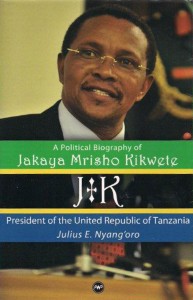
Jayaka Kikwete book cover
Jakaya Mrisho Kikwete has become famous in Tanzania and the world, but few understand who he is; Nyang’oro presents him to the world. He examines his humble beginnings, his rise to power and his avid attempts at advancing the country. This political story of the incumbent president up to early 2010 forms the first volume; the second volume will look at the outcome of the president’s policies. This work is recommended to readers interested in Tanzania politics, especially given the very few political biographies available.
Eloquently, Nyang’oro examines the president’s life from birth on 7 October 1950 at Msoga village of Bagamoyo District in Coast Region. His early involvement in politics started in the Tanganyika African National Union (TANU) Party Youth League at Kibaha Secondary School. Full-time party engagement as TANU secretary in Singida started in 1975 after university graduation; his leadership philosophy being influenced by the founding father of the nation, Mwalimu Julius Nyerere. At national level he became Deputy Minister of Energy and Minerals, then Minister of Finance under the second president Ali Hassan Mwinyi (1985 – 1995). For a decade thereafter he served as the Minister of Foreign Affairs and International Relations under the third president, Benjamin William Mkapa (1995 – 2005). The President’s first and commendable attempt at nomination for Chama cha Mapinduzi (CCM) party candidacy at the presidential election in 1995 was followed by a second and successful run in 2005.
Starting as a son of a District Commissioner in the 1950s, one of the highest posts held by Africans in the colonial administration, and having dedicated himself to politics from an early age, President Kikwete’s unmatched success in politics is unsurprising. Following selection as CCM candidate for the 2005 presidential elections, the president’s mixed emotions in his acceptance speech, with references such as the Chinese proverb ‘…the more you sweat in peacetime, the less you bleed during war…’ hinted how much this meant, and how prepared he was for the political battles to come.
Various successes of the president in his first tenure are highlighted by Nyang’oro. As African Union (AU) Chairman for 2008, along with continued efforts to stabilise the region, his key achievements were the Tanzania-led invasion of the Comoro islands to remove the unconstitutional government of Mohammed Bacar and facilitation of Kenya’s power sharing agreement after the 2007 election violence. Through the AU and the Southern Africa Development Community (SADC), he contributed to the establishment in Zimbabwe of the Government of National Unity in 2009, easing a long- standing dispute between the ruling party of President Robert Mugabe and the opposition party led by Morgan Tsivangirai. President Kikwete continues to advance the country’s international relations, a job he started well when Minister for Foreign Affairs. In-country, efforts to implement CCM’s 2005 election manifesto have included the fight against HIV/AIDS and Malaria, enhancing education with extended secondary school provision and the establishment of the legacy- beckoning University of Dodoma.
The President’s ‘Kilimo Kwanza’ (literally ‘Agriculture First’) initiative to modernise agriculture, Tanzania’s major employer, is not covered as explicitly. Very modest progress could be objectively reported on the implementation of good governance, with most of the grand corruption trials still dragging on in the courts; averting the country’s year-on-year severe energy crises; the government’s unsuccessful grappling with inflation; the deteriorating education standards; and the feet- dragging attitude towards regional integration. To the Tanzania majority, the fourth President’s delivery of ‘Better life for every Tanzanian, It is possible’ is a far cry from ‘New Zeal, New Speed, New Strength’, the CCM campaign slogan in the 2005 presidential elections.
In a straightforward manner Nyang’oro has presented chronologically the president’s life story, interweaved with relevant facts from Tanzanian and African history as well as brief country statistics. Although understanding the complexity of writing on a president still in office, he takes an utterly sympathetic view of the president. Whether this view is due to his choice of sources is hard to tell. The biography would have had added benefit by covering the wider political choices available in the country. While some interpretations provoke alternate views, others seem unfair assessments of past presidents or of Tanzanian democracy; eg, ‘… as expected he will still be president for another five years beyond 2010.’
I have the advantage of doing this review after the country’s October 2010 elections. The president returned to office indeed, though with a reported 61.16% majority, down from 80.28% in 2005 and a decreasing voter turnout-in contrast to the immediate past president, whose majority rose from 61.8% of 1995 to 71.7% in 2000 with an increased voter turnout. While the parliamentary election seats won by the CCM consecutively inched up from 1995 to 2005 under the chairmanship of the immediate past president, reportedly the CCM election seats tally after the 2010 election is back to the 1995 total. Clearly the popularity of the President and the CCM needs re-interpretation. Hopefully in Volume II the author has the opportunity to rigorously re-analyse the fourth President, thereby vitally contributing to the political knowledge of Tanzania.
Siya Paul Rimoy
EXIT FROM EMPIRE – A BIOGRAPHY OF SIR RICHARD TURNBULL by Colin Baker, published by Mpemba Books of Cardiff, 2010. ISBN 978 0 9542020 5 7. Book is available from Colin Baker at 55a Lon y Deri, Cardiff CF14 6JP for £17.50 plus P & P, UK £3, Europe £5.70, ROW £10.60.
For us the most relevant part of Colin Baker’s extremely detailed account of Dick Turnbull’s life and career is the short period of only four and a half years of his service as Governor and then Governor-General of Tanganyika. It saw the rapid advance of Tanganyika from being the least developed and least sophisticated of the three East African territories into becoming the first to achieve full independence, peacefully and without the internal tensions which had arisen in Uganda and in Kenya. Baker’s account contains more detail than has been published before, but the book is a biography, not a political history. That independence came so soon was chiefly due to the personal relationship that developed between Turnbull and Julius Nyerere. It was not what anyone had expected. Turnbull’s reputation when he came to Tanganyika was of the hard man from Kenya – regarded as “the hammer of Mau Mau, the oppressor of the nationalists, the associate of the wicked Kenya settlers” as Turnbull himself put it. His previous 27 years service in Kenya had shaped his character, and built his reputation. Baker reproduces copious extracts from Turnbull’s own letters and diaries describing his experiences and his generally low opinion of Africans and of his Colonial Service colleagues during his Kenya days. He highlights Turnbull’s belief in his own abilities and his determination to advance his career by whatever means. Turnbull’s prowess in long foot-safaris, especially in the harsh conditions of Kenya’s Northern Frontier District (NFD), deliberately out-walking his fellow officers, was well-known. Once he walked 200 miles to meet his DC, decided not to make the call, and walked back again. He planned to be seen by his superiors as more competent, more knowledgeable and more effective than his colleagues. After only 4 years service he was appointed DC Isiolo, and at the age of 39 became Provincial Commissioner in the NFD, a post that was often a stepping-stone to a Governorship. One might wonder how these attributes would have developed in the generally gentler environment of Tanganyika, if Turnbull had been posted there as the Colonial Office had initially intended? It just happened that the Tanganyika vacancy was filled unexpectedly by an officer transferring from Kenya, so Turnbull was sent to Kenya instead.
Little of that background was known when Turnbull arrived as Governor in Dar es Salaam, only days after his 49th birthday. The task facing him then was very different from what it had been in Kenya. The challenge was to manage the pressures of increasingly assertive African nationalism spreading across the continent, inspired by the independence of the Gold Coast in 1956, and given an immediate local boost by the holding in Mwanza of the founding conference of PAFMECA (Pan-African Freedom Movement of East and Central Africa) when Nyerere, as TANU leader, voiced demands for early independence of Tanganyika.
Baker examines the significance of Turnbull’s first meeting with Nyerere, only nine days after his inauguration, and while Nyerere was still awaiting judgement in the trial on charges of criminal libel against two British DCs that the government had brought against him. Knowing Turnbull’s record in Kenya in suppressing the Mau Mau insurrection, which had entailed working closely with the European community there, Nyerere had not expected him to talk about “working together to solve difficult problems” on the way to Independence. Turnbull knew that senior officials in the Administration and Police considered that TANU had extremely wide support throughout the country, and was capable of organising effective action that could completely disrupt normal Government activities.
How serious was the risk of widespread civil disobedience, leading to violence, if TANU’s demands for early self-government (madaraka) by 1959 were not met? There was little hard evidence, save for some incidents in Geita District in Lake Province that had revealed a degree of unrest and a potential for trouble that the Government would have found hard to control. Turnbull told the Colonial Office that the threat was real but political concessions would avoid conflict. Nyerere himself was being pushed by some in TANU who wanted even faster progress. The Colonial Office believed that Turnbull was yielding unnecessarily to fears of a breakdown of law and order. Turnbull took what security precautions were possible, but reported that he could not cope with a serious state of emergency without substantial military assistance, suggesting “eight battalions of British troops”. With considerable reluctance the Colonial Secretaries, first Lennox-Boyd and then Macleod, agreed to each progressive advance that Turnbull recommended, trusting in Nyerere’s good faith, and as each stage was passed so the next one became easier.
The final year as Governor-General was a boring let-down. Turnbull had no power, and his advice was not wanted. On the last day people gathered by the harbour entrance at Magogoni Street to see Turnbull’s departure aboard a Royal Navy frigate. After it had gone, they streamed back towards the town, passing the entrance to what had been Government House, now renamed State House or Ikulu. “Now this is all ours!” they exclaimed. The next morning the PWD began erecting new strong gates and a high security fence to replace the existing low wall around the grounds.
As well as the political record the book includes a revealing section about Life and Work at Government House, describing the human side of Turnbull’s personality, immensely softened from his earlier Kenya bachelor days by the pervasive and supportive influence of his wife and ever loyal companion Beatrice. Baker goes on to recount Turnbull’s later service in Aden, ending in disappointment and a sense of betrayal at being held responsible for the failure of the British Government’s policies which misjudged the force of Arab nationalism in that region.
The book is not a light read, but it is the substantive record of the nature, the career and the life of a man who played such a decisive role in the history of Tanzania.
David Le Breton
DAR ES SALAAM CULTURED STATES: YOUTH, GENDER, AND MODERN STYLE IN 1960’s. Ivaska, Andrew. 2011 Durham and London: Duke University Press. ISBN 978 08223 4 7705. p/b 312pp. £15.99.
Accounts of 1960s Dar es Salaam frequently focus on the ‘high politics’ of Uhuru and life in the new Tanzania. Ivaska’s investigation into official cultural discourse and interventions offers readers an opportunity to (re)live a parallel cultural politics – ‘the long sixties moment’ – as it was played out in the country’s capital. It is a sixties familiar to many; rebellion in afros, played to a soundtrack of soul music that competed against the establishment. As in other capitals of the newly independent African nations, Tanzanian officials attempted to clamp down on this promiscuous urban youth culture, and in so doing plunged themselves into the thick of sharp debates over the meaning of James Brown and hot pants. This was a time of vigorous contestation, and also of apparent paradox: while efforts were made to ban miniskirts and wigs were ceremoniously burnt in the national stadium, Ivaska describes how at the same time in Tanzania the ‘Maasai Progress Plan’ (‘Operation Dress-Up’) attempted to outlaw Maasai traditional dress. These campaigns are covered in scintillating detail, against a background of the shifts in urban demographics and the fault lines of late colonial debates about culture. Such conversations were carried out in the national newspapers that inform Cultured States, which is punctuated with quotes from newspaper letters sections that still resonate in public debate today: “It is a pity to see parents including young children,” wrote ‘Fairness’ in The Standard in November 1969, “mouth-open clapping hands at and even giving ‘tuzo’ [tips] to the actor or actress who performs sexual play (buttock shaking) properly.” The contests over culture are embedded in the book’s exploration of urban struggles around gender, generation, and wealth. These come together in a splendid section on the rise and fall of the university left.
A number of Ivaska’s central arguments cluster around the relationship between the state and cultural production. They provide a lens through which to engage broader themes animating African and postcolonial studies, particularly the issue of power. The kind of prominence official rhetoric achieved on the urban landscape, suggests Ivaska, was often testament less to the power of the state than to its limits. This resonates with Achille Mbembe’s call to approach the state and its subjects as bound up in a domain of ‘conviviality’ in which rulers and ruled are enmeshed in shared categories and discourses. Again, some of these conversations are on-going today: the running commentaries on rumours of scandalous liaisons between ‘city girls’ and elite ‘big men’ that was produced in Dar es Salaam’s popular tabloid press in the sixties, for example, are still being published in newspapers today – albeit now with lightly-censored, graphic photographs.
Ivaska concludes that the long sixties moment still lives on in Dar es Salaam today, and he ends with a brief description of public debate over contentious popular cultural forms at the turn of the century, including hip-hop music and style, beauty contests, comic books, and the ever-persistent miniskirt. New forms of media and communication mean that capturing this contemporary commentary now will take a different methodology to that which has been employed for this study, but one that Ivaska is clearly well-placed to undertake – and, upon reading Cultured States, it is hoped that he uses his considerable knowledge to do so. Cultured States is an engaging and readable commentary on high cultural politics that will appeal equally to those who remember the sixties in Dar es Salaam, and those who don’t.
Thomas Molony
THE LAST SLAVE MARKET – DR JOHN KIRK AND THE STRUGGLE TO END THE AFRICAN SLAVE TRADE, by Alastair Hazell, published by Constable & Robinson, London, 2011, www.constablerobinson.com. ISBN 978-1-84529-672-8 £16.99
The Slavery Abolition Act was enacted in Britain in 1833 and this brought to an end the trade in human beings throughout the British Empire, especially that between Africa and America. However, there were a few exceptions to the areas covered by the new law, the most notable of which was East Africa, where the trade still flourished and was one of the mainstays of the economy of the island of Zanzibar. This exception seemed to go largely unnoticed by the British public, who felt the job was done, and the political lobby to abolish slave trading had all but died out. However, those British subjects posted to East Africa. and in particular Zanzibar, were only too well aware of the continuing trade as dhow loads of slaves passed through the port with regularity.
One of those posted to Zanzibar was John Kirk, a Scottish physician and botanist. Kirk had already seen the trade whilst travelling with Livingstone up the Zambezi River, but never challenged it during his early days on the island. His attitude seemed to be ‘that of a man who gets involved only when he can do good’. As medical officer to the British Consul on the island he was not in a position to do anything, so did not initially get involved.
Hazell tells the story of how Kirk began to study the slave trade, the difficulties he encountered working within the politically charged arena of East Africa, facing unfair criticism at the hands of Henry Morton Stanley, but ultimately playing a pivotal role in abolishing the trade in that area of the world. The book has been well researched, clearly sets out the backgrounds of the major players and explains the events that led to the last slave markets being abolished. But it is not a ‘just the facts’ affair. Hazell manages to inject touches of description into the text which bring it to life. His knowledge of the area, and reading between the lines in the documents he has looked at, allows him to speculate on the kind of weather the island would be experiencing when an event took place , or to give an opinion on how one of the ‘characters’ really felt, despite the politeness of a letter.
These touches help draw the reader into the story and allow them to ‘live through’ the events with those involved. The build-up to Kirk getting the treaty signed felt a little bit like approaching the climax of a thriller as you are eager to find out how he managed to persuade people to abandon a practice which to them was as natural as trading in any other commodity and who saw nothing wrong with it.
‘The Last Slave Market’ is an important book that looks at the life of a relatively unsung hero of the battle against human trafficking and, as the evocative foreword hints, a reminder that the job is still not finished.
John Samson
STREET LEVEL – A COLLECTION OF DRAWINGS AND CREATIVE WRITING INSPIRED BY DAR AS SALAAM. Illustrated and compiled by Sarah Markes. Pub. Mkuki na Nyota 2011 pp 152 ISBN 978-9987-08-117-2.
Available from www.africanbookscollective.com and Amazon £18.95
British illustrator Sarah Markes was greatly taken with Dar es Salaam when she first visited in the year 2000 and dreamed of capturing its atmosphere in her drawings. When she finally returned to live in the city in 2002, she became increasingly unhappy to see more and more solidly built, often unique, old buildings being demolished piecemeal to make way for modern, multi-storey, steel and glass structures. She was determined to do something to raise awareness about what was happening and this book is the result. It is a collection of coloured line drawings interspersed with pieces of prose and poetry by local writers. (A few biographical details would have been welcome here.)
There are eight sections covering not only buildings but also the street vendors who depend on them for a living. A useful map shows the location of the buildings illustrated, and there is a glossary for non-Swahili speakers. In the opening section, architectural historian Karen Moon traces the history of the city from its foundation in 1862 and follows this with an analysis of the way a city’s architecture defines its identity. This is complemented at the end of the book by heritage specialists Simon Odunga and Jeremy Cross with a carefully argued but passionate plea to halt the destruction of that very identity.
The majority of the buildings in the book are (or were) to be found in the old Indian bazaar area of the city that used to be known as Uhindini, but not, as the book states, because most of its residents were Hindu; Uhindini was the common Swahili word for the part of town where Indian traders lived. Here, from the 1920s up until the 1950s, Hindu and Muslim alike invested their profits in highly individualistic buildings, many with names and dates displayed on the façade. Several German colonial buildings are included, as well as a few examples of art deco buildings in the Sea View area.
The book is only slightly marred by a few obvious spelling bloomers and minor factual inaccuracies: Gandhi is misspelled as Ghandi throughout and there are others that should have been spotted by a careful proof-reader. But this does not seriously detract from this delightful coffee table book that anyone with fond memories of Dar es Salaam would be happy to own.
G. Mawji
REVIEWERS
David Le Breton grew up in Kenya and was District officer and Magistrate in Tanganyika 1954-63, being Private Secretary to the Governor, Sir Richard Turnbull Feb 1959-Aug 1960.
Gloria Mawji is a British expatriate who has lived in dar es Salaam for over thirty years and taught at the International School of Tanganyika.
Graham Mercer has lived in Dar es Salaam since 1977, teaching in the elementary department of the International School of Tanganyika for 25 years before retiring to concentrate on writing and photography.
Thomas Molony is a Lecturer in African Studies at the Centre of African Studies, Edinburgh.
Siya Paul Rimoy is a civil engineer serving the Tanzania community on multiple fronts of academia, research and advisory through affiliation to the University of Dar es Salaam and the Industry.


